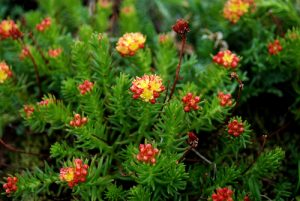4

Rhodiola
Rhodiola rosea, also known as golden root, rose root, Arctic root, and king’s crown, is a perennial flowering plant in the Crassulaceae family. It grows in colder climates around the world, such as the Arctic, the mountains of Central Asia and Europe, Siberia, Scandinavia, Iceland, and northeastern North America.
Rhodiola is a short plant, growing to a maximum height of around 16 inches. Its flowers are yellow to greenish-yellow with occasional red tips.
Rhodiola has been used in Russia and Scandinavia for centuries to cope with the cold climate and the stress associated with that. Rhodiola tea is popular in Tibet, where 30 different species can be found. In Siberia, couples often receive rhodiola roots as a good-luck gift prior to their wedding.
Rhodiola is well known for improving both mental and physical stamina and performance. Over 100 chemical compounds have been identified in its roots, including phenols, organic acids, terpenoids, flavonoids, and alkaloids.
Rhodiola Benefits
The greatest benefits that rhodiola provides is due mostly to its adaptogenic powers. An adaptogen, if you’ve been paying attention, regulates our neurological and physiological responses to all kinds of stress, including environmental, social, physical, emotional, and mental. And it increases our resistance to toxins, sleep deprivation, and even exposure to extreme temperatures.
Adaptogens like rhodiola balance our entire biological system safely and without side effects. The term “adaptogen” was coined by Russian scientist N.V. Lazarev in 1947. Which is appropriate since rhodiola hid behind the soviet curtain until a couple of decades ago.
During the cold war, rhodiola was secretly used to benefit Russian military officers, political leaders, cosmonauts, and Olympic athletes. They were well aware of the benefits it provided. You may recall the Soviets’ dominance at the Olympics during this cold war period.
Besides being a powerful adaptogen, rhodiola benefits include …
- Increased energy and endurance
- Reduction in stress
- Increased vitality
- Weight loss
- Natural treatment for ADHD
- Enhanced cognitive function
- Improved immune function
- Anxiety relief
- Blood sugar stabilization
- Enhanced nervous system health
Rhodiola helps to reduce stress by reducing cortisol, known as the stress hormone. Cortisol is produced by the adrenal gland and released in response to stress or fear, triggering our fight-or-flight mechanism. However, many of us live in this constant state, which is extremely unhealthy. Elevated cortisol levels increase our risk for mental illness, depression, while also lowering our life expectancy.
One of the ways rhodiola increases energy and endurance is by increasing the oxygen-carrying capacity of our red blood cells. This 2013 study on the effects of rhodiola on endurance and exercise performance showed a decrease in heart rate, improved endurance, and a decrease in the perception of effort of the 18 male subjects who participated.[16]
Another study on the effects of rhodiola on sports performance showed similar results.[17] Fourteen male athletes were given a rhodiola supplement for 4 weeks, while 14 others received a placebo. The study concluded that rhodiola supplementation reduced both lactate levels and muscle damage after an exhaustive exercise session, and increased the adaptogenic ability to physical exercise.
Rhodiola helps the body use fat stored in abdominal cells by activating the enzyme known as hormone-sensitive lipase. And a 2010 study on rhodiola’s effect on binge eating concluded that:[18]
Results indicate that R. rosea extracts may have therapeutic properties in bingeing-related eating disorders and that salidroside is the active principle responsible for this effect.
Two of the primary active compounds in rhodiola are salidroside and rosavin. Salidroside helps protect neuron cells from oxidative stress, while rosavin (a glycoside compound) has powerful anti-depressant effects. This 2010 study on the adaptogenic and central nervous system effects of the two showed that they significantly induced anti-depressant, adaptogenic, and stimulating effects.[19] And they did so after just a single dose.
The therapeutic effects of rhodiola on subjects with life-stress symptoms was the subject of this 2012 study.[20] One hundred subjects were given 400 mg of rhodiola each day for 4 weeks. They were then reassessed based on seven questionnaires. And the results? “All tests showed clinically relevant improvements with regard to stress symptoms, disability, functional impairment and overall therapeutic effect.” And perhaps most impressive, improvements were noted after just three days of supplementation.
Rhodiola Uses
Unless you’re living in an area where you can grow rhodiola, you’ll likely be reduced to purchasing dried roots, powder, tinctures, or capsules. I always recommend opting for the most natural approach, and with rhodiola it would be the dried roots. In which case, tea is you’re best and (perhaps) only option.
Having said that, the most important thing when purchasing rhodiola is the presence of certain compounds like rosavin and salidroside, both of which are important for the adaptogenic properties that make rhodiola special. And apparently, where it’s grown is the key, as the harsher the climate, the more adaptogenic properties the plant must develop for its own survival. Which is why, above all else, I recommend Siberian or Tibetan rhodiola. How you choose to take it is a secondary concern.
My go-to source for rhodiola is Lost Empire Herbs. They have a Tibetan rhodiola powdered extract with high amounts of rosavin, salidroside, plus a couple other crucial compounds.
Check out this video, where medicine hunter Chris Kilham takes you to the mountains of northern Asia and tells you about his favorite medicinal plant. I’ll give you a hint, it rhymes with chodiola.
